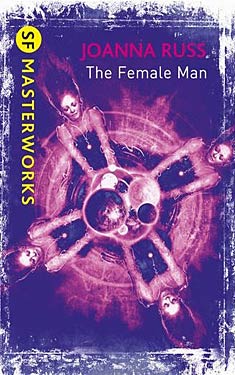Joanna Russ
Completed 4/24/2014, Reviewed 4/24/2014
2 stars
This was one difficult book.
I did not get it, and I never got into it. I got the basic gist, that it’s a feminist
polemic, but past the first few pages, I could barely follow the plot. I was halfway through the book when I decided
to look it up on Wikipedia. And once I
read the entry and all the reviews on WWEnd, I had brief moments of clarity
which were quickly lost by the stream of consciousness narration of the
characters.
The plot, if you can say there really is one, is that a
woman from
one universe gathers instances of herself from three parallel
universes. In various combinations, they
visit each other’s worlds and get to see and comment and criticize each other’s
experience as a woman. Janet comes from
an earth of the future, Whileaway, where all the men died 800 years ago from a
plague. The Lesbian utopia has a very
advanced technology that allows for an agrarian, somewhat peaceful way of
life. Children are produced by splicing
together ova. Jeannine is a librarian
from an earth where the Great Depression never ended. Women are entrenched in stereotypical gender
roles where their only worth is derived from marriage. Joanne is from an earth similar to earth in
the 70’s, when the book was written.
Jael is an assassin from an earth where there is a literal war between
the sexes. Trade agreements still exist
between the sexes where goods are traded for sons, many of whom are forcibly
transgendered to provide “women” for the men.
This seems like a brilliant way to plant a debate into a
story: four instantiations of a person experiencing each other’s experience. Where this failed for me is that the
narrative is told from all four of the J’s perspectives, but with very little
hinting at whose perspective you were in at any one time. One J may be narrating, with the story focus
on another J. Other times, the J may be
talking about herself, but sometimes refers to herself in third person. And lastly, the narrator sometimes is present
in the scene and then a paragraph later, invisible, or first person
omniscient. I was often confused who the
narrator was and in what universe they were visiting. Throughout the text, the narrator goes into
long polemics about the role and plight of women from the context of the
universe they are in at the time. If I was lucky enough to figure out who
was speaking and what was going on in a chapter, I usually lost it because the arguments
and criticisms were long and prolific enough to make me lose track of where I
was in the plot.
This book is considered a classic of SF and feminist
literature. It is certainly a profound
statement on the inequality and treatment of women. But it was all lost on me because the
narrative is so convoluted. If it wasn’t
for Wikipedia, I wouldn’t even have been able to give my synopsis here. Reading it was a chore, I felt like I was
being screamed at most of the time. In
retrospect, I wish we had read this in my college SF Lit class for the female
SF section in addition to Marge Piercy’s “Woman on the Edge of Time”. But I think, as far as trying to make a
statement about prejudice, cruelty, and inequality, a book like “Invisible Man”
by Harlan Ellison was much more successful in conveying the message, at least
to me.
The only part of the book I really enjoyed was pages 140-141
(of my edition) where Russ wrote a page long collection of critical quotes that
accurately predict everything that might be said of the novel. I enjoyed it mostly because she acknowledged
that the book would be unintelligible to many people. But I also loved that she included horribly
sexist statements that would have been unabashedly published in literary and
newspaper reviews back in the ‘60s and ‘70s, which most of us wouldn’t dare say
in public, but is sometimes still be heard in contemporary media.
I want to make clear just because I didn’t like the book, it
doesn’t mean I don’t like its message and intent. I’ve always been a firm believer that we need
the radicals screaming for change so that the rest of us can live comfortably
in their wake. I am often aghast that
young people today declare themselves as anti- feminists, when it is assumed
women can go to work and be something other than a secretary or elevator
operator, or be allowed to vote, among other issues. It was timely for me to read it when the so
many female representatives in Congress just voted against a measure to enforce
equal pay for equal work. I just wish
that the book was structured less like a collection of pre-twentieth century political
pamphlets jumbled together with the torn pages of a short story. Sometimes, the form blurs the message. For this, I have to give it 2 stars.

No comments:
Post a Comment